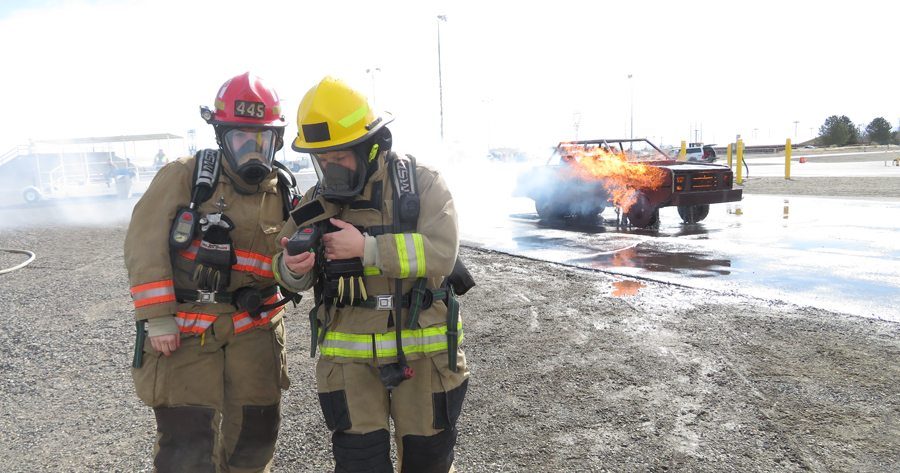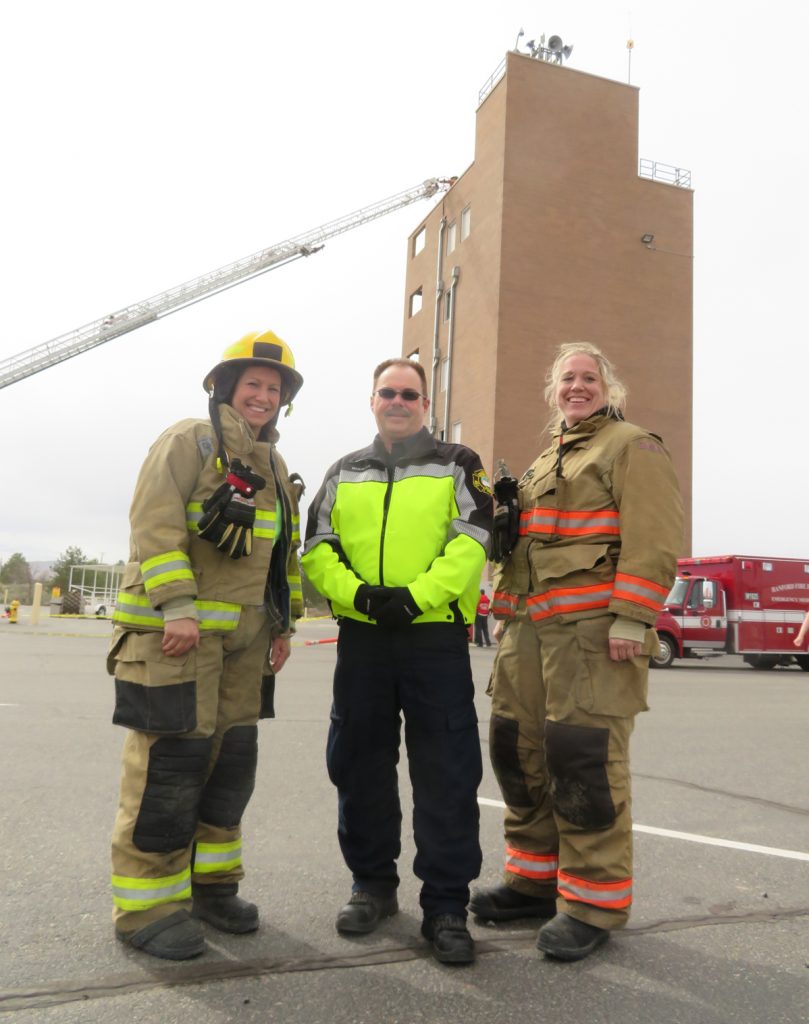
Home » Firefighting experience offers glimpse into servant leadership
Firefighting experience offers glimpse into servant leadership

April 12, 2018
By Melanie Hair
Time critical.
Highly technical.
Labor intensive.
These three phrases were repeated throughout my daylong stint as a firefighter trainee on March 23 at the Volpentest HAMMER federal training facility at the Hanford site in Richland.

Called Fire Ops 101, the multi-agency event is designed to show everyday Joes and Janes what it’s like to perform the many tasks of a firefighter and to better understand the role of our community’s fire service agencies — a critical thing to remember anytime voters cast a ballot for a fire bond or levy, or elected officials consider fire department funding requests.
Eighteen fire agencies — from Spokane, Snohomish and Puyallup to the Tri-Cities and Walla Walla — and 30 participants, including Kennewick Mayor Pro Tem Steve Lee, David Reeploeg, vice president of federal programs for the Tri-City Development Council, and Hilary Franz, state commissioner of public lands, participated.
From wielding a chainsaw to climbing a seven-story ladder in gusting winds, to crawling through a smoke-filled maze to ripping apart an SUV to extricate a dummy — the day proved the work of a firefighter certainly is time critical, highly technical and labor intensive.
But it’s not just that.
Much about firefighting exemplifies servant leadership.
Robert Greenleaf coined the phrase in his 1970 essay, “The Servant as Leader,” in which he asserted servant leadership “begins with the natural feeling that one wants to serve, to serve first. Then conscious choice brings one to aspire to lead.”
In 2016, I graduated from Gonzaga University with a master’s degree in organizational leadership with a servant leadership concentration. A number of classmates during the two-and-half years I spent in the program were professional firefighters, including Crystal Murphy, who was a Lacey Fire District 3 firefighter and emergency medical technician for nine years before she died unexpectedly in December.
Ask anyone who knew her. There was something different and special about Crystal. She exuded compassion and courage.

It wasn’t just her obvious deep love for her wife and their two children, or her devotion to her brothers and sisters in the fire department. It was the way she lit up when she talked about working at Camp Blaze, a free weeklong camp that encourages young women to consider firefighting as a career. Crystal was passionate about mentoring at-risk youth. She lived to serve others; she aspired to lead.
In a practical sense, the servant-leadership philosophy inverts the traditional heavy-handed, autocratic, top-down, hierarchical management model to a reverse pyramid with emphasis on shared status and responsibility, team building and collaboration.
Firefighting strongly relies on trust, teamwork, collaboration and strong communication, which can be the difference between life or death in emergency situations.
Ultimately, servant leaders focus on the growth and well-being of others. They put the needs of the greater good—those of customers, employees and communities—before their own.
Every time firefighters go out on a call, they put the needs of the greater good before their own.
During the firefighter-for-a-day experience, plenty of precautions were put into place to protect participants. That’s not the case during a real emergency.
Firefighters not only risk their lives, they show genuine concern for others. Greenleaf believed that “caring for persons, the more and the less able serving each other, is the rock upon which a good society is built.”
First responders show concern for health, belongings and people in their daily work. They accept the people they encounter—regardless of the situation—as worthy of being taken care of, worthy of being saved.
The next time you are asked to financially support additional fire services and updated equipment on a ballot measure, I urge you to consider the level of care firefighters and EMTs show us. It’s easy to take for granted the services we have available until we are in a situation where every second counts. Let’s remember how our firefighters care for us during our times of need when their departments face funding challenges.
After all, it’s what any good servant leader would do.
Melanie Hair is the general manager and founder of the Tri-Cities Area Journal of Business and Senior Times.
Local News
KEYWORDS april 2018





